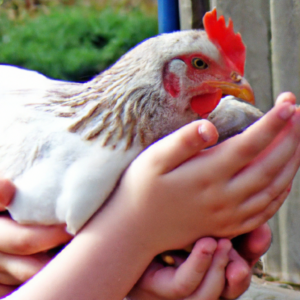
Have you ever wondered how to prevent and treat sour crop in chickens? Sour crop is a common condition that affects poultry, caused by an overgrowth of yeast in the crop. It can lead to discomfort, poor digestion, and weight loss in chickens. In this article, we will explore some effective methods for preventing and treating sour crop, ensuring the health and well-being of your feathered friends. So, let’s dive in and learn how to keep your chickens happy and free from this pesky ailment!

Prevention of Sour Crop
Maintaining a Clean and Hygienic Environment
To prevent sour crop in chickens, it is crucial to maintain a clean and hygienic environment for your flock. Regularly clean and disinfect feeding and watering equipment, as well as the chicken coop. Remove any damp or moldy bedding and replace it with fresh, clean materials. Routinely remove droppings from the coop and keep it well-ventilated to minimize the risk of bacterial or fungal infections.
Balanced Diet and Proper Feeding Practices
A balanced diet is essential for the overall health of your chickens and can significantly help prevent sour crop. Provide a good quality commercial feed specifically formulated for poultry, as it will contain the necessary nutrients chickens need. Supplement their diet with fresh fruits, vegetables, and occasional treats. Avoid feeding your chickens excessive amounts of high-carbohydrate or low-quality food, as it can disrupt their digestive system.
Avoid Overfeeding or Free-Choice Feeding
Overfeeding can contribute to the development of sour crop. To avoid this, maintain a strict feeding schedule and portion control. Follow the recommended guidelines provided by the feed manufacturer or seek advice from a poultry nutritionist. Avoid free-choice feeding, where chickens have unlimited access to food throughout the day. This practice can lead to overeating and digestive issues.
Provide Fresh and Clean Water
Clean, fresh water is essential for preventing sour crop. Make sure your chickens have access to clean water at all times. Regularly check and clean the water containers to prevent any contamination or build-up of bacteria. During extreme weather conditions, such as hot summer days, provide additional water sources or consider adding electrolytes to their water to keep them well hydrated.
Avoid Feeding Moldy or Spoiled Food
Feeding chickens moldy or spoiled food can cause digestive problems and increase the risk of sour crop. Always check the freshness of the food before offering it to your flock. Inspect grains, fruits, and vegetables for any signs of mold or spoilage. If in doubt, discard the questionable food items.
Promote Natural Foraging Behavior
Chickens are natural foragers and allowing them to engage in this behavior can help prevent sour crop. Encourage free-range or supervised foraging sessions where your chickens can find insects, worms, and greens. This not only provides additional nutrients but also keeps them active and helps maintain a healthy digestive system.
Regular Health Checks and Vaccinations
Regular health checks and vaccinations are essential in preventing sour crop and other health issues in your flock. Consult with a poultry veterinarian to develop a routine health check schedule and vaccination plan suitable for your chickens. By detecting any potential health problems early on and administering necessary vaccines, you can significantly reduce the risk of sour crop.
Monitoring and Managing Stress Levels
Stress can weaken a chicken’s immune system and make them more susceptible to various health issues, including sour crop. Take steps to minimize stress in your flock by providing a calm and secure environment. Minimize loud noises, sudden changes in their surroundings, or overcrowding. Additionally, handle your chickens gently and avoid unnecessary disturbances.
Minimize Exposure to Toxins and Chemicals
Toxins and chemicals can cause digestive disturbances and contribute to sour crop. Minimize your chickens’ exposure to pesticides, herbicides, and harmful cleaning products. Use natural or organic alternatives when possible, and ensure proper ventilation when using any chemical substances in or around the chicken coop.
Quarantine New Birds and Monitor Flock Integration
When introducing new birds to your existing flock, it is crucial to quarantine them before integrating them. This prevents the spread of potential diseases and reduces the risk of sour crop. Quarantine new birds in a separate area for a minimum of two weeks and monitor them closely for any signs of illness. After the quarantine period, gradually introduce them to the existing flock while closely monitoring their health and behavior.

Treatment of Sour Crop
Identifying Sour Crop Symptoms
Early identification of sour crop symptoms is crucial for prompt treatment. Some common symptoms include a distended crop, foul-smelling breath, regurgitation, weight loss, decreased appetite, and general lethargy. If you notice any of these signs in your chicken, it is essential to address the issue immediately to prevent further complications.
Initial Steps: Isolate and Withhold Food
When you suspect sour crop in one of your chickens, the initial steps involve isolating the affected bird from the rest of the flock to prevent the potential spread of the condition. Withhold food temporarily to allow the crop to empty and lessen the strain on the digestive system. However, it is crucial to ensure that the chicken still has access to fresh water for hydration.
Temporarily Restrict Access to Water
While water is necessary for hydration, restricted access to water can help in the treatment of sour crop. Limiting water intake for a short period can help reduce the fermentation and proliferation of yeast or bacteria in the crop. Consult with a poultry veterinarian for guidance on the duration of water restriction, as it should not be prolonged to avoid dehydration.
Massage and Physical Manipulation
Massage and physical manipulation can aid in dislodging impacted material in the crop and promoting digestion. Gently massage the crop in a downward motion to help break up and dislodge any blockages. You can also try gently manipulating the crop using a warm, damp cloth to encourage the movement of contents.
Administering Oral Fluids for Rehydration
Rehydration is crucial during the treatment of sour crop, especially if the chicken has had restricted access to water. Administering oral fluids, such as electrolyte solutions, can help restore hydration levels. Follow the instructions provided by the veterinarian on the appropriate amount and frequency of oral fluids based on the chicken’s size and condition.
Dietary Adjustments: Offer Soft and Moist Food
To alleviate the strain on the digestive system, offer your chicken soft and moist food during the treatment of sour crop. This helps in easier digestion and prevents further blockages. Consider feeding a mixture of wetted commercial feed, soaked pellets, or homemade mash. Ensure the food is easily breakable and does not require excessive effort to consume.
Probiotics and Natural Remedies
Probiotics can help restore the balance of beneficial bacteria in the digestive system, aiding in the treatment of sour crop. Consult with a poultry veterinarian to determine the appropriate probiotic supplement and dosing for your chicken. Additionally, natural remedies such as apple cider vinegar or garlic can be beneficial for their antimicrobial properties. Always consult with a professional for guidance on the use of natural remedies.
Use of Anti-fungal Medication
In cases where sour crop is caused by a fungal infection, the use of anti-fungal medication may be necessary. Consult with a poultry veterinarian to determine the appropriate medication and dosage. It is crucial to follow the prescribed treatment regimen and monitor the chicken’s response to ensure effective resolution of the infection.
Surgical Intervention (Rare Cases)
In rare cases where sour crop does not respond to conventional treatment methods, surgical intervention may be required. This option is typically considered when there is a severe blockage or if other treatments have been unsuccessful. Surgery should only be performed by a qualified veterinarian experienced in avian surgeries.
Monitoring and Follow-up Care
During the treatment of sour crop, regular monitoring is necessary to assess the chicken’s progress and adjust the treatment plan if needed. Keep a close eye on the bird’s crop size, appetite, and overall behavior. If there are no signs of improvement or if the condition worsens, consult with a poultry veterinarian for further evaluation and guidance.
Remember, prevention is always better than cure. By implementing proper preventive measures and maintaining a healthy environment for your flock, you can significantly reduce the risk of sour crop in your chickens. If you suspect sour crop, act promptly and follow the treatment steps outlined above to ensure the best possible outcome for your feathered friends.








